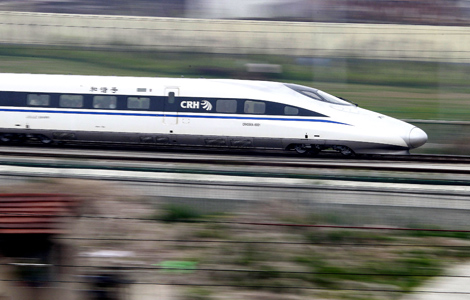Audit shows fraud on high-speed rail project
Updated: 2012-03-20 10:05
By Xin Dingding (China Daily)
|
||||||||
|
 |
|
A bullet train snakes its way along the Beijing-Shanghai High-Speed Railway. [Photo / Xinhua] |
A report released by the National Audit Office on Monday showed more evidence of fraud, waste, mismanagement and irregular procurement totaling billions of yuan connected to the Beijing-Shanghai High-Speed Railway.
The report marked the end of a three-year audit aiming to regulate the major railway project's management and use of funds.
Most of the problems pinpointed have been corrected, said a senior audit official, adding that the railway sector will remain its focus in the future.
The third audit report into the rail link that opened in June last year found that irregularities started from the bidding process on the project as early as December 2007, five months before construction began.
Auditors found the Ministry of Railways shortened the period for bidders to get preliminary review application documents to 13 hours from the standard five days, and cut the period for bidders to submit applications to less than 24 hours from the standard seven days.
Purchases that were not made through standard bidding involved 849 million yuan ($134 million). In one case, the project's chief constructor, Beijing-Shanghai High-Speed Railway Co, was found to have bought at least 77.86 million yuan worth of materials from non-bidding suppliers since October 2009, part of which were bought at higher prices than those quoted by winning bidders.
The company also purchased 698 million yuan worth of materials in August 2009 from as many as 10 bidding suppliers, instead of following bidding principles to find the most economic combination of suppliers.
"The Ministry of Railways noted that it will strictly follow rules in future bidding for construction and material purchase, and it has issued two regulations to perfect its bidding system," the audit report said.
By the end of June, at least 196.3 billion yuan - compared with an estimated budget of 163.8 billion yuan - has been spent on land expropriation and construction for the mammoth 1,318-km rail project, the report said.
The total investment for the railway was earlier estimated at 217.6 billion yuan, which also included an estimated 53.8 billion yuan for the purchase of trains and loan interest during construction.
The auditors found that 413 million yuan spent on train windshields was wasted after the line's operation speed was lowered and design specifications were changed, the report said.
The ministry has responded to the auditors by saying that the windshields would be used in other railway projects.
The auditors had also found evidence of wrongdoing by local governments.
Jiangning Economic Development Zone in Nanjing was found to have applied for land compensation worth 140 million yuan from the railway using false documents, receiving 40 million yuan in payments by the end of June.
Beichen district government in Tianjin had 340 million yuan in its own accounts instead of using it to promptly pay compensation for land expropriated for the railway.
The report said local governments are investigating the cases.
The Beijing-Shanghai High-Speed Railway has also struggled to pay suppliers and contractors. By the end of May, the railway had 8.25 billion yuan in debts owed to 656 suppliers and 1,471 contractors.
Previous reports were published in 2010 and 2011 by the top auditor.
Xu Aisheng, chief of the fixed assets investment audit department at the National Audit Office, said that all three auditing reports have found problems including mismanagement, fraud and irregular procurement.
"Thanks to effective measures taken by the Ministry of Railways and local governments, the problems found in the past three years have mostly been settled," he said.
"As railway projects involve huge amounts of investment, the National Audit Office will continue its focus on the railway sector," he said.
The report has again raised concerns in cyberspace, as netizens urged punishment for those found responsible.
"It's no use to just point out the problems," said a netizen named "Qian'anshi" on a micro blog.
Li Chengyan, a professor in the School of Government at Peking University, said that auditing is the first step for anti-corruption moves.
"When problems in cash flow or management are uncovered, discipline departments will step in to conduct further investigations," he said.
With the rollout of the country's high-speed rail network, the crackdown on corruption in the sector led to investigations of more than 10 railway officials last year.
The list includes Liu Zhijun, former railway minister, who was removed from his post in early 2011 for "serious disciplinary violations".
xindingding@chinadaily.com.cn

 Relief reaches isolated village
Relief reaches isolated village
 Rainfall poses new threats to quake-hit region
Rainfall poses new threats to quake-hit region
 Funerals begin for Boston bombing victims
Funerals begin for Boston bombing victims
 Quake takeaway from China's Air Force
Quake takeaway from China's Air Force
 Obama celebrates young inventors at science fair
Obama celebrates young inventors at science fair
 Earth Day marked around the world
Earth Day marked around the world
 Volunteer team helping students find sense of normalcy
Volunteer team helping students find sense of normalcy
 Ethnic groups quick to join rescue efforts
Ethnic groups quick to join rescue efforts
Most Viewed
Editor's Picks

|

|

|

|

|

|
Today's Top News
Health new priority for quake zone
Xi meets US top military officer
Japan's boats driven out of Diaoyu
China mulls online shopping legislation
Bird flu death toll rises to 22
Putin appoints new ambassador to China
Japanese ships blocked from Diaoyu Islands
Inspired by Guan, more Chinese pick up golf
US Weekly

|

|







